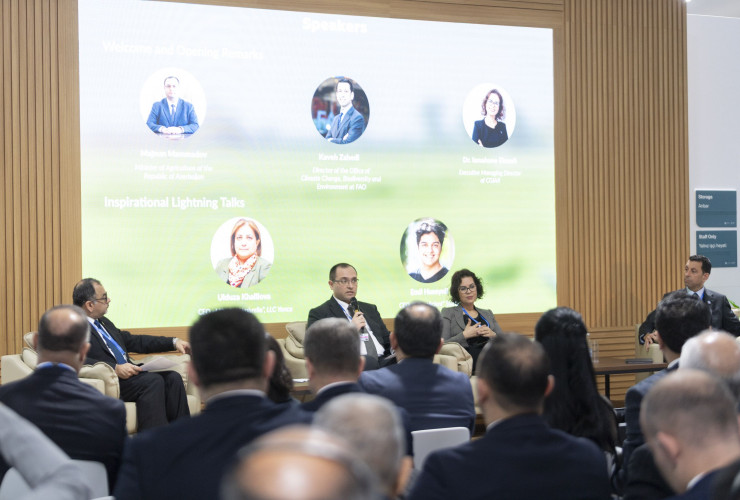
In parallel with the Blue Zone, events are also continuing in the Green Zone as part of the COP29 international climate conference, which will continue until November 22.
Within the framework of the 29th session of the Conference of the Parties to the UN Framework Convention on Climate Change held in Baku, the Ministry of Agriculture, the Consultative Group on International Agricultural Research (CGIAR) and the Food and Agriculture Organization of the United Nations (FAO) jointly organized an event in the "Green Zone" on the topic of "AgriFuture 2024: Impact of investments in human capital on sustainable agricultural transformation". The event included panel discussions on the role of women, youth and innovation in climate-resilient agriculture for a sustainable and equitable future and its impact on climate action, and human capital for climate-resilient agri-food systems: leadership, science and community perspectives.
Opening the event with an introductory speech, Minister of Agriculture Majnun Mammadov said that agriculture, by constituting the basis of society, plays an important role in supporting the economy, ensuring employment of the population, and providing food. Currently, climate change, limited resources, and changing market demands are putting pressure on the agricultural sector from all sides. It was emphasized that as part of the measures taken to develop the agricultural sector in Azerbaijan, the correct assessment of the potential opportunities of young people and women, increasing their employment level, and stimulating their participation in innovative projects are among the main goals of the agricultural policy.
Speaking at the panel session, Ismahane Elouafi, Executive Director of the International Center for Agricultural Research in Dry Areas (ICARDA), and Kaveh Zahedi, Director of the Climate Change, Biodiversity and Environment Office of the Food and Agriculture Organization of the United Nations (FAO), touched upon the importance of the active participation of women and youth in addressing global challenges such as climate change, food security and water scarcity, and shared their views on the importance of applying digital technologies in agriculture, the role of digital solutions in automating production, ways to reduce the impacts of climate change, and ways to increase productivity.
Minister Majnun Mammadov informed the participants of the event that the “Baku Harmony Climate Initiative” for Farmers, which includes agricultural, environmental and climate issues in Azerbaijan, will be opened for more detailed discussions the next day in order to solve the difficulties faced by farmers. It was noted that Harmonia will serve as a central platform connecting various initiatives, coalitions and partnerships, focusing on promoting climate change adaptation and sustainable development in agriculture, food systems and water management, supporting the transformation of agricultural systems, mobilizing investments that support sustainable agriculture, and empowering farmers, especially women and youth, who are the backbone of agriculture and the main driving force for future sustainability.
In the panel session on "Human Capital for Climate-Resilient Agro-Food Systems: Leadership, Science, and Community Perspectives", Akmal Akramkhanov, a specialist at the International Center for Agricultural Research in Drylands (ICARDA), Gulbeniz Ganbarova, Chairwoman of the Azerbaijan Rural Women's Association, Emil Huseynli, CEO of the Agroficient startup, Ulduz Khalilova, CEO of Digital Umbrella, and Aly Abousabaa, CGIAR Regional Director for Central and West Asia and North Africa, addressed the topics of supporting individual farms, ensuring food security, the impact of climate change on the agricultural sector, digital agriculture, efficient use of land and water resources, protection of natural resources and ecological balance, digital transformation of agri-food systems, and establishing a sustainable agricultural system for the sustainable development of rural areas and communities, and answered questions from the event participants.
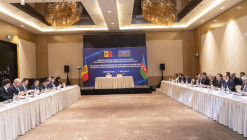
The 6th meeting of the joint intergovernmental commission on economic cooperation between the Republic of Azerbaijan and the Republic of Moldova was held in Baku
11 April 2025
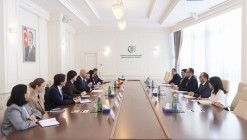
Minister of Agriculture Majnun Mammadov met with Moldovan delegation
09 April 2025
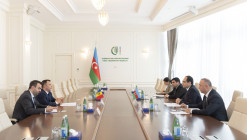
Minister Majnun Mammadov met with the Ambassador of Moldova to Azerbaijan
09 April 2025
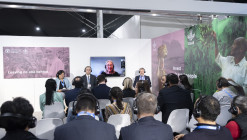
A panel discussion was held on the topic of “Just Transition in the Agriculture-Food System: Integration in Accordance with the COP29 Harmony Initiative” within the framework of COP29
21 November 2024

A panel discussion on achieving sustainable agro-food systems was held within the framework of COP29
21 November 2024